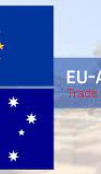EU in Australia partners with the Australian Human Rights Commission to deliver a lecture on cultural diversity

The European union delegation to australia supported the 2021 Kep Enderby Memorial lecture on cultural diversity, organised by the Australian Human Rights Commission.
More than 1800 people signed up for this inspiring occasion where different experts and young voices discussed thought-provoking issues like cultural integrity and the fight against racism.
The Kep Enderby Memorial Lecture is an annual public event held by the Australian Human Rights Commission to honour the memory of the hon. Kep enderby qc (1926-2015), who as attorney-general introduced the racial discrimination bill to parliament in 1975. Each year, the lecture advances public understanding and debate about the racial discrimination act 1975, racism and race relations.
EU Ambassador Michael Pulch gave some introductory remarks: "the EU has done many things to promote cultural diversity, including intercultural dialogues which were first instituted in the early 2000s". Ambssador Pulch also highlighted that cultural diversity is just one of many aspects that is shared by both the European Union and Australia: "you have your racial discrimination act. In the EU we have the 2000 Race Equality Directive which all Member States have now transposed into law. You have your Australian Human Rights Commission, and we have the Fundamental Rights Agency and our Charter of Fundamental Rights is legally binding".
Acclaimed writer Alice Pung delivered the keynote address talking about the importance of words and the power of language when tackling cultural diversity.
The lecture ended up with a panel discussion. Several young australians from diverse backgrounds joined the discussion following Alice's lecture. They engaged on a debate around important questions like "how to do the work" when it comes to inspiring social unity and respect to cultural diversity in the australian communities.
The participants of the panel discussion were:
Kupakwashe Matangira: an activist, social entrepreneur, global voices policy fellow and youth rights practitioner for save the children. Driven by her passion for human rights and social justice, kupa believes in the power of young people to create change and be a positive voice in australian and world affairs. Kupas study of politics, philosophy and economics supports her efforts to address pressing social issues and advance human rights.
Zaahir Edries: a south african-born, australian human rights lawyer, community advocate, writer and media commentator. He has spoken widely on issues around diversity, inclusion, migrant settlement, and the muslim experience in australia. He is the general counsel of getup, an executive consultant for the online progressive engagement network, and was formerly the president and a founding member of the muslim legal network nsw. Zaahir has a particular interest in the use of legislative instruments to curtail civil liberties and the disproportionate impact on marginalised communities.
Jidah Clark: a djab wurrung man from western victoria. He is a lawyer, historian and community advocate with strong policy expertise. His experience crosses commercial litigation, human rights, youth justice, child protection, community development, and cultural heritage. Jidah currently works at abstarr consulting, specialising in the art and science of decolonisation, and sits on the expert advisory committee for the yoo-rrook justice commission, australias first formal truth-telling process. Jidah has an interest in using lessons from history and indigenous knowledges to create equitable and just systems for first nations peoples, and recently led a state-wide systemic inquiry named 'our youth, our way', aimed at eliminating the over-representation of aboriginal young people in victorias youth justice system.





